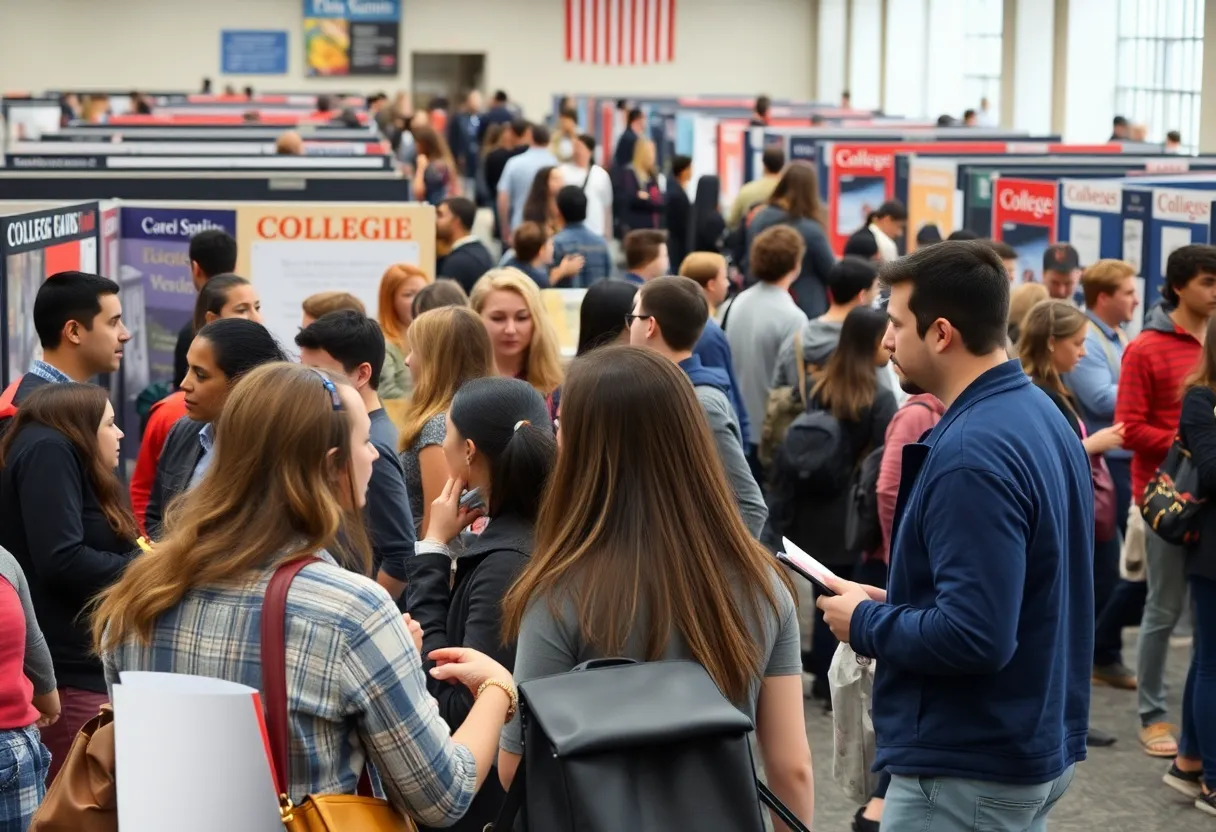News Summary
As Massachusetts approaches a looming demographic cliff, the higher education landscape is set for significant shifts. With a projected decline of 72,000 high school graduates by 2041, many institutions face potential closure or merging. Experts warn of adverse effects on workforce sectors reliant on skilled graduates. Contributing factors include decreasing birth rates and high tuition costs, making higher education less accessible. Community colleges may offer a glimmer of hope in addressing these issues by providing skills training for diverse populations, but immediate action is essential for sustainability.
Massachusetts Faces Higher Education Crisis as Demographic Cliff Approaches
In the bustling city of Boston, college recruiters recently gathered at a fair filled with excitement yet tinged with apprehension as they awaited high school students. With 272 exhibitors from various institutions of higher education, the fair buzzed with representatives eager to catch the attention of students and their parents. The energetic atmosphere was palpable as recruiters looked to collect contact information to engage sophomores and juniors, hoping to market their schools to the next generation of students.
Concerns Over Enrollment
However, behind the cheerful façade lies a pressing concern among college representatives that cannot be ignored—the looming demographic cliff. Starting next year, the number of college-age 18-year-olds is projected to decline significantly, with an anticipated nationwide drop of 13% by 2041. Massachusetts, in particular, will experience a staggering decrease, estimating about 72,000 fewer high school graduates over the same period. This isn’t just a number; since 2012, the state has seen a decline of over 45,000 college students, which equates to approximately 9%.
Impacts on Institutions
The fallout from this demographic shift could be severe. Experts are predicting that many colleges and universities in Massachusetts might face closure or be forced to merge in the coming years. In fact, around 12 colleges and universities have already shut down or merged in the last decade, trying to navigate the challenging landscape of higher education. With higher education being the third-largest industry in the state, these changes could ripple through the economy, affecting not only students but also the local business scene that thrives in college towns.
The Ripple Effect on Workforce
As enrollment drops, the implications extend beyond the colleges themselves. The workforce in key sectors such as health care and professional services is expected to suffer. With an anticipated 2,200 fewer graduates annually in life sciences alone, the potential for worker shortages looms large, even as these sectors continue to demand talent. Such declines in enrollment also highlight a disturbing trend across the Northeast, where neighboring states like New York and Rhode Island are predicted to experience even greater demographic changes.
Causative Factors
This demographic crisis can be traced back to several compounding factors. Sharp decreases in birth rates following the Great Recession have resulted in fewer students entering the education system. Changing societal attitudes regarding family planning and increasing child care costs further exacerbate the problem. Additionally, with private college tuition in Massachusetts being 44% higher than the national average, many families may find it increasingly impractical to pursue higher education for their children.
Adapting to Change
Interestingly, while the overall acceptance rates may improve for prospective students, and tuition growth may slow, this does little to alleviate the concerns for colleges that heavily rely on student fees. In fact, ratings from agencies like Fitch bond have categorized the outlook for the higher education sector as “deteriorating.” As smaller colleges in the region grapple with these challenges, they stand to lose local market share, impacting not only students but the local businesses that rely on college patronage.
Future Workforce Needs
With approximately 40 colleges in Massachusetts facing significant risk, experts underline the urgency for immediate action. The declining enrollment could potentially lead to a major shortage of skilled workers within critical sectors over the next decade. The influx of immigrants has helped prop up the workforce thus far, but tightening immigration policies could put that lifeline at risk. Additionally, efforts to engage low-income, first-generation, and racial minority students have been less than effective, with current initiatives only reaching 4% of low-income students in Massachusetts.
A New Hope?
Community colleges, often labeled as underfunded and overlooked, may hold the key to counteracting these challenges. They provide an accessible way for older individuals who have not completed their degrees to gain skills to meet workforce demands. Innovative programs focused on community college transfers are essential in alleviating some pressures from declining enrollments as experts stress the need for systemic changes to ensure the sustainability of the economy and educational quality in Massachusetts.
Deeper Dive: News & Info About This Topic
HERE Resources
Consumer Sentiment Plummets Amid Inflation Fears
Boston’s Development Dilemma: Community Fund Raises Eyebrows
Massachusetts Faces Enrollment Crisis in Private Colleges
Boston’s Mayoral Race Sees New Challenger: Domingos DaRosa
Additional Resources
- 247Sports: BC Hockey Offseason Primer
- Wikipedia: Demographic Cliff
- SI: Recruiting Tracker Class of 2026
- Google Search: Higher Education Crisis in Massachusetts
- BC Eagles: Women’s Basketball Inks Four
- Encyclopedia Britannica: Higher Education
- On3: South Carolina Basketball Transfer Portal
- Google News: Massachusetts Demographic Decline







